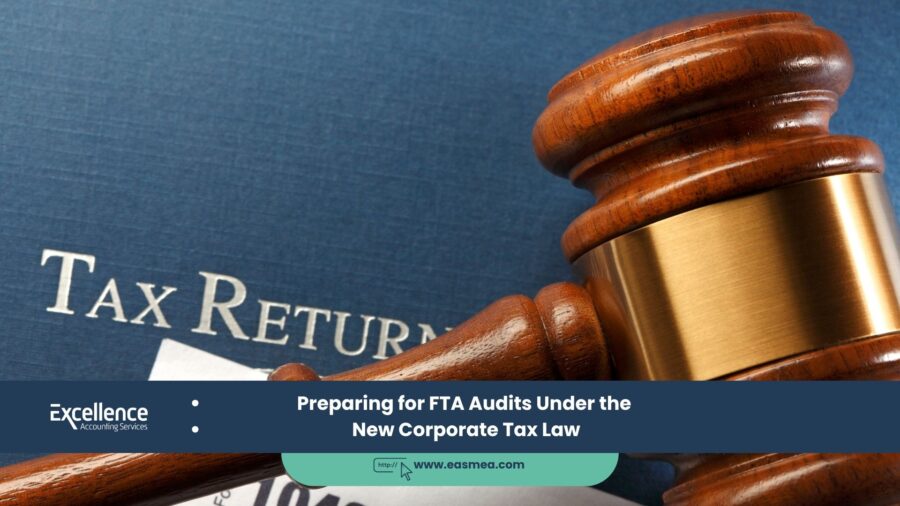Preparing for FTA Audits: A Comprehensive Guide for UAE Businesses Under the New Corporate Tax Law
With the implementation of the UAE Corporate Tax, the phrase “FTA audit” has taken on a new level of significance for every business in the country. An audit by the Federal Tax Authority is no longer a distant possibility but a standard component of the new regulatory framework. It’s a mechanism to ensure the integrity of the tax system and verify that businesses are accurately reporting their income and paying their fair share of tax.
- Preparing for FTA Audits: A Comprehensive Guide for UAE Businesses Under the New Corporate Tax Law
- Understanding the FTA Audit: The Why, What, and How
- Step 1: Building an Indisputable Foundation of Documentation
- Step 2: The Pre-emptive Strike - Conduct a Mock Audit
- How Excellence Accounting Services (EAS) Can Make You Audit-Ready
- Step 3: Managing the Audit Process - Best Practices
- Frequently Asked Questions (FAQs) About FTA Audits
- Transform Audit Risk into Business Resilience.
The critical mistake is to view an audit as something that only happens to businesses suspected of wrongdoing. In reality, audits can be triggered by a variety of factors, including random selection, industry-specific risk profiles, or complex transactional histories. Therefore, the question is not *if* your business will ever face scrutiny from the FTA, but *when*—and more importantly, *how prepared* you will be when that notification arrives.
Being “audit-ready” is not a one-time project; it’s a continuous state of operational excellence. It means embedding compliance, transparency, and meticulous record-keeping into the very DNA of your financial operations. This guide provides a strategic roadmap for preparing for an FTA audit under the new Corporate Tax law. We will explore the entire audit lifecycle, from understanding why audits happen to implementing best practices for documentation, conducting pre-emptive health checks, and managing the audit process itself.
Key Takeaways
- Audit Readiness is a Continuous State: Preparation starts from your very first transaction under the Corporate Tax regime, not when you receive an audit notice.
- Documentation is Your Shield: The burden of proof is on the taxpayer. Every figure on your tax return must be backed by clear, complete, and contemporaneous evidence.
- Understand the FTA’s Focus: Audits will concentrate on high-risk areas like transfer pricing, expense deductibility, and the validity of Free Zone qualifying status.
- Proactive Reviews are Essential: Conducting internal mock audits or professional “health checks” can uncover and rectify weaknesses before the FTA does.
- A Structured Process is Key: Having a clear plan for managing an audit, including a single point of contact and a documentation log, is crucial for a smooth process.
Understanding the FTA Audit: The Why, What, and How
An FTA audit is a formal examination of a taxpayer’s financial records to verify that they have complied with tax laws and regulations. The goal is to ensure the accuracy of the tax return filed and the amount of tax paid.
Why Audits Happen
The FTA uses a sophisticated, risk-based approach to select businesses for audit. Triggers can include:
- Risk-Based Selection: The FTA’s systems may flag businesses in certain industries or those with complex structures (e.g., multiple related parties, international transactions) as higher risk.
- Data Inconsistencies: Discrepancies between your Corporate Tax return and your VAT returns, or significant fluctuations in revenue or expenses compared to previous years.
- Persistent Late Filings: A history of missing deadlines can signal poor internal controls.
- Large or Unusual Transactions: Significant one-off transactions or claims for large tax refunds may invite closer inspection.
- Random Selection: To ensure broad compliance, the FTA will also audit a certain percentage of businesses at random.
Step 1: Building an Indisputable Foundation of Documentation
The bedrock of any successful audit defense is documentation. The UAE Corporate Tax law requires businesses to maintain all relevant records for at least seven years. This goes far beyond just keeping invoices.
Your Audit-Ready Document Checklist:
- Core Financial Statements: This includes your Balance Sheet, Income Statement, and Cash Flow Statement, preferably audited if you meet the criteria. These must reconcile perfectly with your tax return. A service for professional financial reporting is key here.
- Detailed General Ledger & Trial Balances: The FTA will want to see the detailed transaction listings that make up the summary figures in your financial statements.
- Transactional Evidence: For every single transaction, you need a complete paper trail: purchase orders, supplier invoices, sales invoices, contracts, delivery notes, and proof of payment (bank statements). Contracts are especially important as they prove the commercial rationale and business purpose of a transaction.
- Tax-Specific Schedules: Prepare detailed calculations that bridge your accounting profit to your taxable income. This must include schedules for non-deductible expenses (e.g., client entertainment), interest expense limitations, and any other tax adjustments.
- Transfer Pricing (TP) Documentation: For businesses with related party transactions, maintaining robust TP documentation (like a Local File and Master File, if applicable) is mandatory and will be a primary focus of any audit. Expert UAE Corporate Tax advisory is critical for this.
- Statutory Records: Your trade license, Memorandum of Association (MOA), shareholder register, and employee records (to support payroll deductions).
Think of it this way: if an auditor picks any number from your tax return, you should be able to produce a complete, logical, and documented trail back to the source transaction in under five minutes.
Step 2: The Pre-emptive Strike – Conduct a Mock Audit
The best time to find a problem is before the auditor does. A proactive internal review, or “mock audit,” is one of the most effective ways to prepare. This involves simulating an FTA audit to pressure-test your systems, controls, and documentation.
How to Conduct an Effective Mock Audit:
- Engage an Independent Expert: While an internal review is good, engaging a professional firm for an internal audit or an accounting review provides an unbiased, expert perspective. They know what the FTA looks for.
- Focus on High-Risk Areas: Pay special attention to the areas the FTA will scrutinize most heavily: related party transactions, major expense claims, revenue recognition policies, and, for Free Zone entities, the segregation of Qualifying vs. non-Qualifying income.
- Test Your Documentation Retrieval: Randomly select a sample of transactions and try to gather all the supporting documents. This will quickly reveal any gaps in your record-keeping process.
- Review Tax Positions: Challenge the tax positions you have taken. Is your justification for deducting a certain expense robust? Is your transfer pricing policy defensible?
- Document Findings and Remediate: Create a formal report of all findings and an action plan to fix any identified weaknesses immediately.
How Excellence Accounting Services (EAS) Can Make You Audit-Ready
An FTA audit can be a daunting process, but you don’t have to face it alone. EAS provides specialized services designed to prepare your business for the highest level of scrutiny, ensuring peace of mind and minimizing risk.
- FTA Audit Readiness Assessment: Our experts conduct a comprehensive review of your financial records, tax positions, and internal controls to identify potential red flags before the FTA does. This is a core part of our internal audit services.
- Documentation & Compliance Review: We help you organize and collate all necessary documentation, ensuring your records are complete, accurate, and ready for submission. Our accounting and bookkeeping services ensure your foundation is solid.
- Mock Audit Simulation: We simulate the entire FTA audit process, from initial information requests to detailed questioning, providing you with a real-world preparation experience and a clear remediation plan.
- Audit Representation & Support: Should you receive an audit notice, our team can act as your official representative. We manage communications with the FTA, prepare responses to queries, and defend your tax positions, allowing you to focus on running your business. Our senior experts within our CFO services can lead this representation.
Step 3: Managing the Audit Process – Best Practices
If you receive an audit notification, a calm, structured, and professional approach is essential.
- Appoint a Single Point of Contact (SPOC): All communication with the FTA should flow through one knowledgeable person (e.g., your CFO, finance manager, or external tax advisor). This prevents conflicting information from being shared.
- Acknowledge and Respond Promptly: Acknowledge receipt of the audit notice and ensure you understand the scope and timelines. Respond to all information requests within the stipulated deadlines.
- Provide Only What is Asked For: Answer the auditor’s questions accurately and provide the specific documents requested. Do not volunteer unsolicited information or documents, as this can unnecessarily widen the scope of the audit.
- Maintain an Audit Log: Keep a detailed log of every request from the FTA, the date it was received, the documents submitted in response, and the date of submission. This creates a clear audit trail of the process.
- Be Professional and Cooperative: A cooperative and transparent attitude can foster a more positive audit experience. However, this does not mean you should not defend your position if you believe it is correct and well-documented.
Frequently Asked Questions (FAQs) About FTA Audits
The FTA will issue a formal written notification of the audit, typically through the EmaraTax portal or to the registered address of the business. The notice will state that your business has been selected for a tax audit and will usually specify the tax period(s) under review.
The tax procedures law generally gives a taxpayer at least 20 business days to provide the requested information. The specific deadline will be mentioned in the FTA’s request. It is crucial to meet this deadline. If you genuinely need more time to compile the information, you can submit a formal request for an extension, providing valid reasons.
If a primary document (like an invoice) is missing, you must demonstrate that you have made every reasonable effort to obtain it. You can provide alternative or secondary evidence to support the transaction (e.g., a contract, payment proof, and email correspondence). If you cannot provide any credible evidence, the FTA has the right to disallow the related deduction or adjust the revenue, which could result in additional tax and penalties.
Yes. The law grants the FTA the authority to enter a taxpayer’s business premises to conduct an on-site audit. They can access original documents, records, and systems. They must provide you with at least five business days’ notice before such a visit, unless they suspect tax evasion.
There are specific administrative penalties for hindering a tax audit. For instance, the penalty for failing to provide requested records is AED 10,000 for the first instance and AED 20,000 for a repeated failure. Intentionally obstructing auditors can lead to more severe consequences.
No business is completely “safe.” While the FTA may focus on larger businesses, audits can be conducted on any taxpayer, including those claiming Small Business Relief, to verify their eligibility (i.e., that their revenue is genuinely below the AED 3 million threshold). Random selection also means any business can be chosen.
An internal audit is a proactive, voluntary process initiated by the company’s management. Its purpose is to improve internal controls, identify inefficiencies, and manage risk. An FTA audit is an external, mandatory process initiated by the government. Its sole purpose is to verify tax compliance.
If the audit uncovers an error resulting in an underpayment of tax, the FTA will issue a tax assessment with the corrected amount of tax due, plus penalties. Penalties can include a fixed penalty and a percentage-based penalty on the unpaid tax. You will have a specified period to pay the assessed amount or to formally dispute the FTA’s findings if you disagree.
No. An external financial audit does not grant immunity from an FTA tax audit. However, it is highly beneficial. Having professionally audited financial statements adds a significant layer of credibility to your tax return and demonstrates good governance. It ensures your records are already organized and IFRS-compliant, making the FTA audit process much smoother and reducing the likelihood of errors being found.
First, designate a single point of contact (SPOC) who is trained to handle the audit. Instruct all other employees that if they are approached by an FTA official, they should be professional and polite, and immediately direct the official to the designated SPOC. Staff should not attempt to answer questions or provide documents themselves. This ensures all communication is controlled, consistent, and accurate.
Conclusion: From Apprehension to Advantage
An FTA audit should not be a source of fear for a well-managed business. Instead, it should be viewed as an opportunity to validate the strength of your financial controls and compliance framework. By embracing a mindset of continuous audit readiness, you transform a potential risk into a strategic advantage. Businesses that are transparent, organized, and compliant are not only better prepared for audits but are also more efficient, credible, and attractive to investors and partners.
The journey to audit readiness begins today. By implementing the strategies outlined in this guide, you are not just preparing for an audit; you are building a more resilient and financially sound enterprise for the future.




